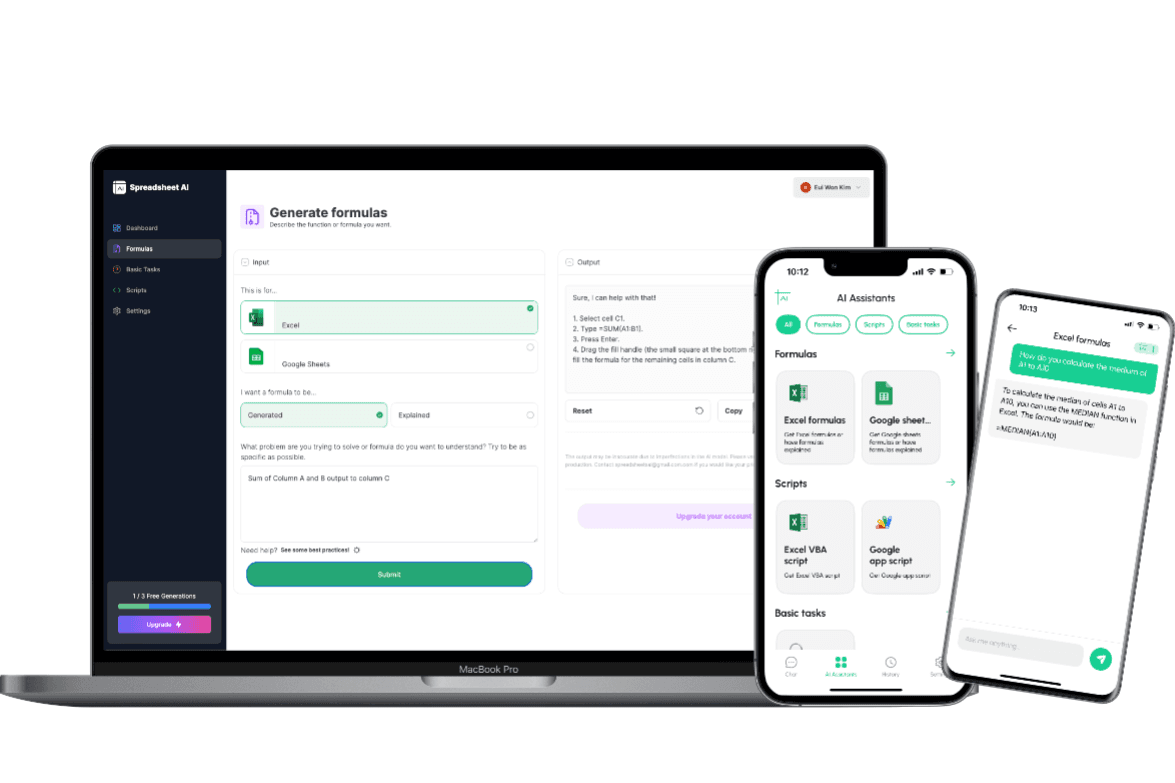Formula generator for PHI FUNCTION function
AI Excel Bot is your ultimate companion for generating and comprehending Excel and Google Sheets formulas. With its advanced capabilities, it goes beyond the basics by providing support for VBA and custom tasks. Let AI Excel Bot empower you to unlock the full potential of these spreadsheet platforms.
Formula generator
Spreadsheet AI is the #1 AI for generating and comprehending Excel and Google Sheets formulas. With its advanced capabilities, it goes beyond the basics by providing support for VBA and custom tasks. Streamline your spreadsheet with Spreadshee AI

How to generate an PHI FUNCTION formula using AI.
To obtain information on the ARRAY_CONSTRAIN formula, you could ask the AI chatbot the following question: “To obtain the PHI formula, you can ask the AI chatbot the following question: "What is the formula to calculate PHI in Excel?" The chatbot should then provide you with the appropriate formula to calculate PHI in Excel.”
PHI FUNCTION formula syntax
The PHI syntax in Excel refers to the use of the IF function combined with logical operators to perform conditional calculations. It follows the format: =IF(logical_test, value_if_true, value_if_false) The logical_test is an expression that evaluates to either TRUE or FALSE. If the logical_test is TRUE, the formula returns the value specified in value_if_true. If the logical_test is FALSE, the formula returns the value specified in value_if_false. You can use various logical operators such as equal to (=), not equal to (<>), greater than (>), less than (<), greater than or equal to (>=), and less than or equal to (<=) to create the logical_test. The PHI syntax is commonly used to perform calculations based on certain conditions, such as calculating a bonus if sales exceed a certain amount or displaying "Pass" or "Fail" based on a student's grade.
Use Cases & Examples
In these use cases, we use the PHI function to calculate the cumulative distribution function (CDF) for a standard normal distribution. The PHI function returns the probability that a random variable from the standard normal distribution is less than or equal to a specified value.
Calculating Z-scores
Description
In this use case, we use the PHI function to calculate the Z-score for a given value in a dataset. The Z-score measures how many standard deviations an observation or data point is from the mean of a distribution.
Result
Result=PHI((A2-B2)/C2)
Calculating Cumulative Probability
Description
In this use case, we use the PHI function to calculate the cumulative probability of a random variable being less than or equal to a specific value in a normal distribution. This can be useful in various statistical analyses.
Result
=PHI((A2-B2)/C2)
Hypothesis Testing
Description
In this use case, we use the PHI function to perform hypothesis testing in a normal distribution. The PHI function helps us calculate the probability of observing a test statistic as extreme as the one calculated, assuming the null hypothesis is true.
Result
=PHI((A2-B2)/C2)
AI tips
Enhance Your Excel Efficiency with AI Tips: Discover our innovative Excel add-in feature, ‘AI Tips.’ Streamline your workflow and boost productivity as AI-powered suggestions offer real-time insights for optimal spreadsheet organization, data analysis, and visualization. Elevate your Excel experience with intelligent recommendations tailored to your unique needs, helping you work smarter and achieve more.
Provide Clear Context
When describing your requirements to the AI, provide clear and concise context about the data you have, the specific task you want to accomplish, and any relevant constraints or conditions. This helps the AI understand the problem accurately.
Include Key Details
Include important details such as column names, data ranges, and specific criteria that need to be considered in the formula. The more precise and specific you are, the better the AI can generate an appropriate formula.
Use Examples
If possible, provide examples or sample data to illustrate the desired outcome. This can help the AI better understand the pattern or logic you are looking for in the formula.
Mention Desired Functionality
Clearly articulate the functionality you want the formula to achieve. Specify if you are looking for lookups, calculations, aggregations, or any other specific operations.